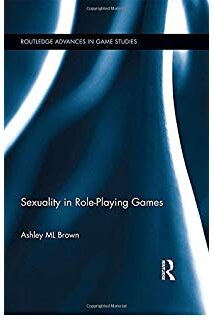Brown’s book is an accessible read for graduate-level students and scholars alike and would make a great supplemental text for a digital rhetoric, digital humanities, or sociology course. The first chapter, “Sex, Games, and Sex Games,” acts as a primer for introducing the theories and connections between philosophy, sexuality, and gameplay. Brown then uses Michel Foucault to further define erotic role play, establishing the role play as a means to explore unconventional means of sexuality without supplanting “normative notions of ‘austere’ sexuality” (8) or ERP, and how it has been evident in other genres of play beyond video and tabletop, via childhood games such as Spin the Bottle and Seven Minutes in Heaven. With role playing games, Brown asserts that participants are able to temporarily challenge power structures but without challenging the sexual norms of hegemonic reality, “After the [BDSM] session is complete, participants return to their existing roles and the existing power structures between participants is also reasserted” (6).
The following chapter, “Erotic Role Players,” attempts to define who involve themselves in erotic role play. Trying to define who these players are proves problematic for Brown. As she explains, Western European and American sexualities are relatively prudish, and so, it is difficult to calculate or outline general characteristics of the ERP population. This is unfortunate, because quantitative research would possibly prove beneficial in backing up Brown’s qualitative findings regarding ERP.
The chapter “Multiple Frames” discusses whether or not ERP-ers follow a certain formula when pursuing amorous relationships in their gameplay or if they deviate from societal norms and expectations. After conducting interviews with ERP-ers, Brown finds that some of these players will choose or create characters whose gender and sexuality differ widely from their own in real life. Several interviewees who identify as either bi-, hetero-, or homosexual report creating characters that have a gender or sexuality different from their own in real life. One interviewee, who goes by the name of "Megan," admitted to having a voracious sexual appetite online, compared with her almost non-existent offline sex life with her husband. Interestingly enough, Megan says that her husband knows of the rendezvouses she has had with other players online, but does not seem intrigued or disturbed by it. It is interesting to note that the majority of the interviewees have a keen awareness of the separation between gaming life and real life. From an outside perspective, popular images of Leroy Jenkins and Eric Cartman create a stereotype for erotic role-players: heterosexual white males who are unable to disconnect or differentiate between the lives they have in games and the ones they have in the real world. However, upon reading Brown’s interviews with fellow gamers, the reader finds out that, with the exception of one person who goes by the pseudonym of "Dirty Old Troll," most interviewees make clear distinctions between their lives inside and outside of gaming.
The chapter “The Role of Rules” discusses the issue of rules implemented by game environments such as World of Warcraft, as well as personal rules implemented by the players themselves, and how they influence gameplay. Brown discusses how players, when confronted with restricted rules involving ERP, such as in Warcraft, go around or bend the rules in order to form sexual relationships with other players. Rules implemented by the companies that produce these games are, as Brown explains, often enforced due to players that are under the age of eighteen that play RPGs. While these rules act as a safeguard, some of Brown’s interviewees state that the rules are easy enough to get around, and that some have been playing video games such as Warcraft since they were the age of six years old. Other ERP-ers implement rules to set up a sense of boundaries, as well as to ensure that relationships outside of the gaming world are not tested or dissolved. (An example is the forbiddance of rape storylines, or preventing characters from participating in rape). One of the reasons one interviewee told Brown that they participate in ERP is due to the fact that they believe that it can strengthen relationships and friendships between players, as well as enhance the storytelling.
Sexuality in Role-Playing Games is a worthy addition to the field of digital rhetoric, simply for tearing apart the assumptions once and currently held about sexuality and gaming culture. That said, the scope is limited geographically, as it extends only to North American and British gaming culture. Future studies might recreate Brown’s interviews, surveys, and research in RPG sexuality to the other side of the globe, especially since Asian countries are known for their RPG video games and large gaming communities. What’s more, scholars working on this topic will eventually need the reinforcement of quantitative research to further validate assumption that the offline lives of gamers and their online ERP are inextricably intertwined. The study adds emotional depth and understanding to a topic that often seems taboo or strange to those outside gaming communities, and makes an important contribution to the growing body of knowledge surrounding online sexuality, more broadly.
- Kathleen L. Irwin, Texas Woman’s University

